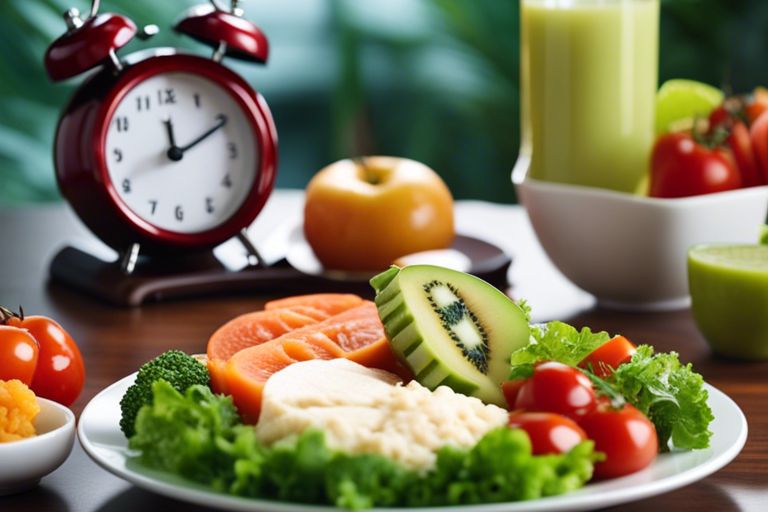
Options seem endless when it comes to what you can eat during intermittent fasting, but making informed and healthy choices is crucial for overall well-being. While the flexibility of this eating pattern allows for some indulgences, focusing on nutrient-dense foods is key to supporting your health goals. We probe into the dos and don’ts of eating during intermittent fasting to help you navigate your dietary decisions with confidence and success.
Key Takeaways:
- Balance is key: Even during intermittent fasting, it is important to maintain a balanced and nutritious diet to support overall health.
- Focus on quality: Opt for whole, nutrient-dense foods such as fruits, vegetables, lean proteins, and whole grains during eating windows.
- Mindful eating: Pay attention to hunger cues and make conscious choices to avoid overeating or consuming excessive unhealthy foods.
- Avoid excessive indulgence: While occasional treats are okay, overindulging in unhealthy foods can negate the benefits of intermittent fasting.
- Stay hydrated: Drink plenty of water during fasting periods to stay hydrated and support overall well-being.
Understanding Intermittent Fasting
Definition and Types
One of the most popular dietary trends in recent years, intermittent fasting involves cycling between periods of eating and fasting. There are several different approaches to intermittent fasting, with the most common methods including the 16/8 method, the 5:2 method, and the eat-stop-eat method. Each type varies in terms of the length of fasting periods and the frequency of meals allowed during the eating window.
With the 16/8 method, individuals fast for 16 hours a day and consume all their meals within an 8-hour window. The 5:2 method involves eating normally for five days a week and restricting calorie intake to 500-600 calories on the other two non-consecutive days. The eat-stop-eat method requires a full 24-hour fast once or twice a week.
- Intermittent fasting involves cycling between periods of eating and fasting.
- Common types include the 16/8 method, the 5:2 method, and the eat-stop-eat method.
- The 16/8 method involves fasting for 16 hours a day and eating within an 8-hour window.
- The 5:2 method consists of eating normally for five days and limiting calories to 500-600 on two non-consecutive days.
- Eat-stop-eat requires a 24-hour fast once or twice a week.
Though the specific protocols may vary, the underlying principle of all intermittent fasting methods remains the same: consuming fewer calories overall. Importantly, during the fasting periods, the body switches from using glucose as its primary energy source to burning stored fat for fuel. This metabolic shift is what makes intermittent fasting an effective weight loss strategy.
Metabolic Changes in Fasting
An intermittent fasting regimen can lead to significant metabolic changes in the body. During the fasting period, insulin levels drop, and the body’s cells become more sensitive to insulin. As a result, the body can more effectively manage blood sugar levels and prevent spikes and crashes.
To fully understand the metabolic changes that occur during fasting, it’s crucial to recognize the importance of ketosis. Ketosis is a state in which the body produces ketone bodies as an alternative fuel source when glucose is scarce. This process not only aids in fat loss but also provides a steady supply of energy for the body and brain.
The Myth and Reality of Eating “Anything”
Some individuals believe that during intermittent fasting, they can eat anything they want during their eating window without consequences. While this idea may sound appealing, it is important to distinguish between myth and reality when it comes to dietary choices during intermittent fasting.
Common Misconceptions
For some, the misconception that you can eat anything and still experience benefits from intermittent fasting is widespread. It is crucial to understand that the quality of food consumed during the eating window can significantly impact the results of fasting. Consuming high-calorie, processed foods high in sugar and unhealthy fats can counteract the positive effects of fasting and may even lead to weight gain or other health issues.
Additionally, another common misconception is that consuming larger quantities of food during the eating window is permissible since fasting periods are prolonged. However, overeating can still lead to weight gain and other negative health outcomes, regardless of the fasting schedule.
Impact of Food Quality on Intermittent Fasting
For individuals practicing intermittent fasting, the quality of food consumed is just as important as the timing of meals. Healthy, nutrient-dense foods such as fruits, vegetables, lean proteins, and whole grains can support overall health and enhance the benefits of fasting. These foods provide crucial nutrients and promote satiety, helping individuals feel satisfied during the fasting period.
With that in mind, it is crucial to focus on consuming a balanced diet that includes a variety of nutrient-rich foods to support overall health and well-being. By prioritizing the quality of food consumed during the eating window, individuals can maximize the benefits of intermittent fasting and support their long-term health goals.

Guidelines for Eating During Intermittent Fasting
Not sure what to eat during intermittent fasting? Navigating dietary choices can be challenging, but with the right guidelines, you can make the most of your fasting window. Following a structured eating plan can balance your energy levels, improve focus, and support overall health. To make the most of your intermittent fasting journey, check out this Intermittent Fasting Meal Plan: Exactly When & What To Eat.
Recommended Foods and Nutrients
An crucial aspect of intermittent fasting is consuming nutrient-dense foods that provide sustained energy throughout your fasting period. Opt for whole foods such as fruits, vegetables, lean proteins, and healthy fats to support your body’s functions and maintain muscle mass. Incorporating nutrient-rich foods like nuts, seeds, and legumes can help you feel full and satisfied during the fasting window, preventing excessive cravings.
Focus on consuming foods high in fiber to aid digestion and promote a feeling of fullness. Hydration is key, so remember to drink plenty of water and herbal teas during fasting periods to stay hydrated and support metabolic processes.
Foods to Avoid or Limit
The key to successful intermittent fasting is to avoid or limit processed foods, sugary drinks, and refined carbohydrates. These foods can cause blood sugar spikes and crashes, leading to increased hunger and energy fluctuations. Steer clear of fried foods, sugary snacks, and sugary beverages that can sabotage your fasting goals and negatively impact your health.
Refined sugars and artificial sweeteners can disrupt your fasting state and may lead to cravings and overeating. Additionally, excessive caffeine consumption can interfere with your sleep quality and metabolism, so it’s best to limit your intake during fasting hours.
Eating a diet high in processed and sugary foods can hinder your progress with intermittent fasting and may lead to health issues in the long run. It’s important to prioritize nutrient-dense foods and mindful eating habits to support your fasting goals and overall well-being.
Strategies for Successful Intermittent Fasting
Meal Planning Tips
After deciding to initiate on an intermittent fasting journey, meal planning becomes crucial for success. Planning ahead helps ensure you stay on track with your dietary goals and avoid making impulsive, unhealthy food choices during your eating window. In terms of meal planning, consider the following tips to make your fasting experience easier and more effective:
- Plan your meals ahead of time to avoid last-minute decisions.
- Include a good balance of macronutrients – protein, carbohydrates, and fats – in your meals to keep you satiated and energized throughout the day.
- Prepare and portion your meals in advance to avoid overeating during your eating window.
Knowing what you will eat and having it readily available can help prevent you from reaching for unhealthy snacks or fast food options. It also allows you to make conscious decisions about what you are putting into your body.
Incorporating Balanced Meals
Successful incorporation of balanced meals during intermittent fasting involves careful consideration of the nutrient content in your meals. It is vital to include a variety of nutrient-dense foods to ensure you are meeting your dietary needs and maintaining optimal health. Aim to include a source of protein, healthy fats, complex carbohydrates, and plenty of fruits and vegetables in each meal to keep your body fueled and metabolism running smoothly.
Incorporating a balanced meal not only supports your overall well-being, but it also helps prevent nutrient deficiencies and energy crashes during your fasting periods. By prioritizing nutrient-rich foods in your meals, you can ensure that your body is receiving the necessary vitamins and minerals it needs to function optimally while burning fat for fuel.

Conclusion
With this in mind, while intermittent fasting does offer some flexibility in terms of what you can eat, it is still important to make smart and healthy dietary choices during your eating window. Opting for nutrient-dense foods like fruits, vegetables, whole grains, lean proteins, and healthy fats will not only help support your overall health but also maximize the benefits of intermittent fasting. Do not forget, the key is to strike a balance between enjoying your meals and nourishing your body effectively. So, yes, you can eat a variety of foods during intermittent fasting, but making wise choices will ultimately lead to better results and long-term success.
FAQ
Q: What is Intermittent Fasting?
A: Intermittent fasting is an eating pattern where you cycle between periods of eating and fasting. It does not dictate specific foods to eat but rather when you should eat them.
Q: Can you really eat anything during intermittent fasting?
A: While intermittent fasting does not restrict specific foods, it is important to focus on nutrient-dense and balanced meals during eating periods to support overall health and well-being.
Q: What can you eat during the eating periods of intermittent fasting?
A: You can eat a variety of whole foods such as fruits, vegetables, lean proteins, whole grains, and healthy fats to maintain optimal nutrition while following intermittent fasting.
Q: Is it okay to consume sugary or processed foods during intermittent fasting?
A: Consuming excessive amounts of sugary or processed foods can undermine the benefits of intermittent fasting and may negatively impact your health. It is best to focus on whole, unprocessed foods for optimal results.
Q: How important is hydration during intermittent fasting?
A: Staying hydrated is crucial during intermittent fasting to support digestion, metabolism, and overall well-being. Be sure to drink plenty of water and other hydrating beverages during both fasting and eating periods.
Q: Can you drink beverages like coffee or tea during the fasting period?
A: Yes, you can drink non-caloric beverages such as black coffee, green tea, or herbal tea during the fasting period. Just be mindful of additives like sugar or cream that may break your fast.
Q: Are there any specific foods that can enhance the benefits of intermittent fasting?
A: Foods high in antioxidants, fiber, and healthy fats can complement the effects of intermittent fasting. Incorporate ingredients like berries, leafy greens, nuts, and avocados into your meals for added nutritional benefits.







